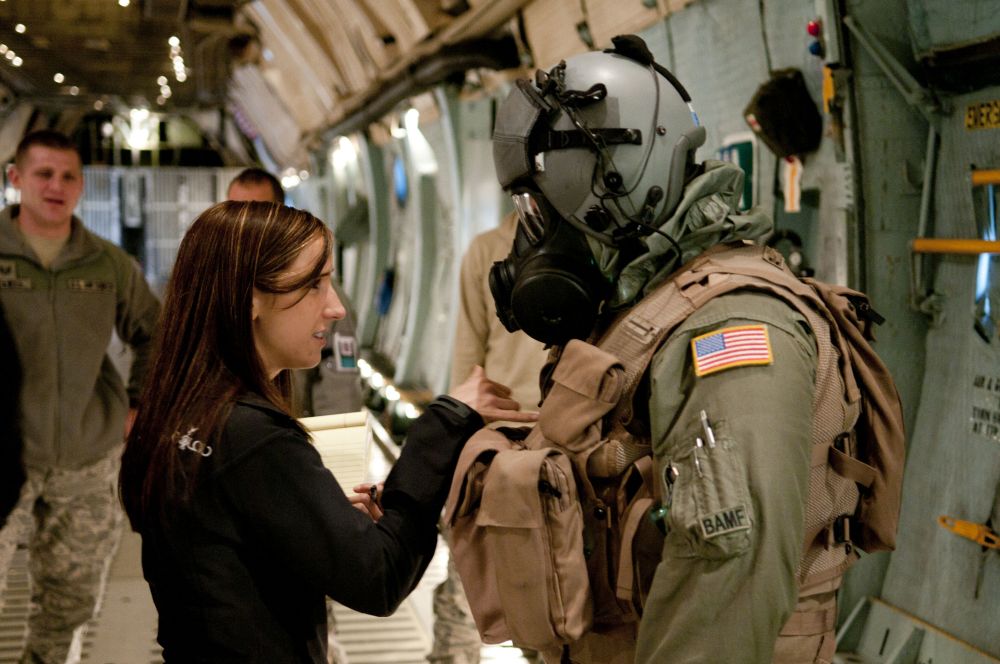ABOARD A MILITARY AIRCRAFT, Feb. 1, 2012 — Defense Secretary Leon E. Panetta said today he will stress during this week’s NATO defense ministers conference that ongoing coalition commitment is essential to success in Afghanistan.
“One of the pillars of our strategy is to build on successful partnerships, and NATO is, without question, one of the most successful military alliances in history,” the secretary told reporters traveling with him to Brussels.
Panetta said ministers will discuss key issues such as funding for Afghanistan’s army and police forces, as well as carrying through the strategy agreed upon at the alliance’s November 2010 summit in Lisbon, Portugal. The strategy calls for leading up to security transition to Afghan forces in 2014 and then consolidating the Afghan lead for security responsibility.
As the strategy outlines, Panetta said, the NATO-led International Security Assistance Force in Afghanistan will shift during the final phase of transition to Afghan lead in mid-to-late 2013 from a primarily combat mission to a training and advisory role as Afghan forces take responsibility for security there.
“We’ve got to stick to the Lisbon strategy,” Panetta said. “The United States has a very strong commitment to Lisbon and to the strategy that was laid out there. What we want is for all of our partners to adhere to that strategy.”
Panetta said he understands French President Nikolas Sarkozy’s recent statement that he would remove French combat troops from Afghanistan after an Afghan soldier killed four French troops Jan. 20. While he was saddened at the loss of life, Panetta added, his understanding is that the French government still plans to contribute to ISAF, possibly with trainers.
“My hope is that at this ministerial, we can discuss this decision and hopefully bring [France] back into the Lisbon strategy so that we can all walk forward together,” he said.
ISAF efforts turned a corner in 2011, the secretary said, with lower levels of violence, a sustained ISAF effort targeting Taliban leaders and an Afghan army that “stepped up to the challenge” of assuming security in parts of the country.
“About 50 percent of the population of Afghanistan will now be under Afghan governance and security,” he said. “That’s an important step.”
Next year will be even more critical, Panetta noted, as Afghan forces take responsibility for the final, tougher areas in Afghanistan, while 2014 will involve “consolidating the transition, making sure those gains are, in fact, held.”
Panetta said President Barack Obama has made clear that U.S. troops will have an enduring presence in Afghanistan beyond 2014 — in counterterrorism and “train, advise and assist” roles, for example. No final decisions have been made about exact numbers or missions after 2014, he added.
The secretary said he will seek 1 billion euros in funding for Afghan army and police forces in discussions with his fellow defense ministers, and that he would like to expand the current funding pool to include more nations, such as Arab countries, Japan and South Korea.
“The key is to have a sufficient and sustainable [Afghan] force that can be there for the future,” Panetta said. “One of the things we’ll be discussing is the size that force should be, but a lot of that is going to be dependent on the funds.”
The secretary said another key message he brings to the ministerial conference is the strong and continuing U.S. commitment to Europe and to NATO. He added he hopes to encourage the alliance to adopt a strategy-based approach to future defense needs, as the United States did.
The recently released U.S. defense strategic guidance informs Defense Department planning for the military up to 2020, the secretary said, and “in many ways … NATO has to go through the same process, of looking forward and deciding what kind of force” it wants by the end of the decade.
DOD’s Joint Operational Access Concept, also released in recent weeks, stresses that U.S. forces must in the future operate and deploy quickly, across services and domains, and with an integrated attention to cyber and space threats along with sea, land and air operations.
In September, NATO Secretary General Anders Fogh Rasmussen outlined his vision for NATO moving forward. “We must prioritize, we must specialize, and we must seek multinational solutions,” he said. “Taken together, this is what I call ’smart defense.’ ”
Panetta acknowledged that budget pressures argue for combining defense capabilities within the alliance, but he told reporters that shedding vital programs can be risky. “What I don’t want to see is ’smart defense’ used as an excuse for not maintaining core capabilities,” the secretary said.
The danger in future crises is that a nation that opts out of the situation “could take an important capability with it that NATO may need,” he added.
Panetta said he also hopes to discuss future European engagement between U.S. and other NATO troops. Even after the Defense Department removes two of the Army’s brigade combat teams from Europe, he said, the region will host the world’s largest U.S. military presence, which will then be 37,000 troops.
A senior defense official said Panetta will meet tomorrow before the formal ministerial conference with representatives from ISAF troop-contributing nations, including non-NATO members Australia and Georgia. During the ministerial sessions, the secretary will confer with NATO ISAF member nations’ ministers, and will meet Feb. 3 with representatives of all 50 troop-contributing nations, the official said.
Ministers also will discuss operations in Kosovo, where Kosovo-Serbian clashes sparked through late last year, the official said.
“The ministers are going to review strategy and force posture … [and] make sure that we maintain sufficient capabilities there to deal with any renewed flare-up in tensions,” the official said.
Source:
U.S. Department of Defense
Office of the Assistant Secretary of Defense (Public Affairs)

 von
von 